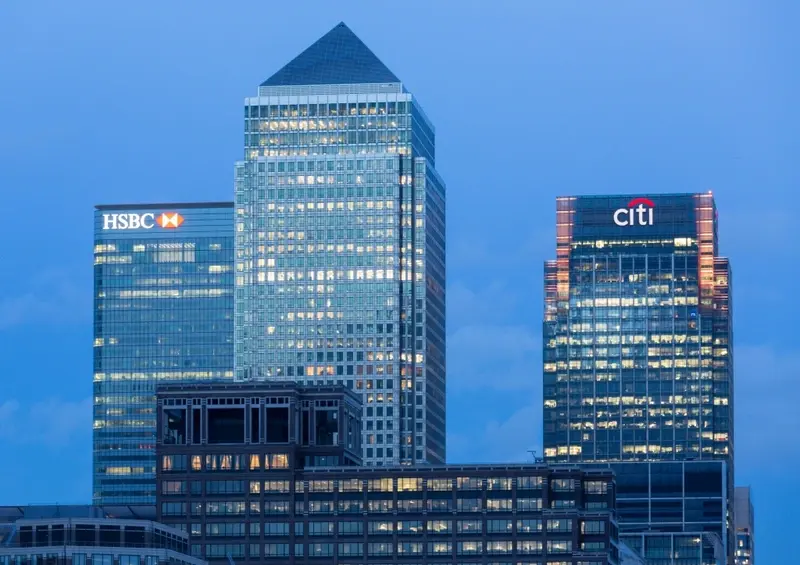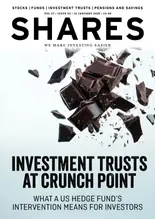
Stocks in London were sharply lower at midday on Friday as banking stocks fell deep in the red.
‘It is difficult to see a path through the current turmoil around inflation, rates, geopolitical tensions and the recent banking crisis which doesn’t involve some pain. At best there is a good deal more uncertainty than there was a month ago and if there’s one thing which markets cannot stand it is uncertainty,’ said Russ Mould, investment director at AJ Bell.
The FTSE 100 index was down 134.67 points, or 1.8%, at 7,364.93. The FTSE 250 was down 286.18 points, 1.5%, at 18,443.14, and the AIM All-Share was down 7.75 points, or 1.0%, at 799.69.
The Cboe UK 100 was down 1.9% at 736.06, the Cboe UK 250 was down 1.7% at 16,023.44, and the Cboe Small Companies was down 1.9% at 12,882.05.
The UK private sector remained in growth in March, thanks to a strong performance by service providers, survey results from S&P Global showed.
The headline seasonally adjusted S&P Global flash composite purchasing managers’ output index registered 52.2 points in March, down from February’s eight-month high of 53.1.
Though the reading dropped in March, it remained above the 50.0 no-change mark that separates growth from contraction. The composite PMI combines the services and manufacturing sectors.
Market consensus had expected the composite PMI to fall to 52.8, according to FXStreet.
‘With the flash PMI surveys signalling a second month of rising output in March, the UK economy looks to have returned to growth in the first quarter. The surveys are broadly consistent [gross domestic product] growing at only a modest quarterly rate of 0.2%, but this represents a welcome expansion compared to the lack of growth seen in the second half of last year,’ said Chris Williamson, chief business economist at S&P Global Market Intelligence.
The pound was quoted at $1.2213 at midday on Friday in London, down from $1.2325 at the close on Thursday.
In London, banking stocks were amongst the worst blue-chip performers at midday as contagion fears linger amid continuing financial sector instability.
HSBC was down 4.2%, NatWest dropped 5.9%, Standard Chartered lost 5.6%, Barclays fell 6.7%, and Lloyds was trading 3.7% lower.
The poor performance came as shares in Deutsche Bank came under heavy selling pressure following a rise in the cost of its credit default swaps. The stock was down 13% in Frankfurt.
Credit default swaps are a form of insurance for bondholders against a potential default. A rising price indicates investors are more concerned about the possibility of default.
Citing S&P Market Intelligence data, Reuters noted the price of the Frankfurt-based bank’s CDS jumped to 173 basis points on Thursday from 142 points the day before.
Meanwhile, Smiths Group added 0.4% after it raised annual revenue guidance and interim payouts, after a strong half-year.
In the six months to January 31, the engineering firm said revenue rose 26% year-on-year to £1.50 billion from £1.19 billion. This included around £127 million in favourable foreign exchange effects, Smiths noted.
On an organic basis, revenue rose 14%. This was in line with the ‘low double-digit percentage organic’ growth Smiths said it was expecting for the period in January.
In the year to July 31, it now expects ‘at least’ 8% growth in organic revenue. This was higher than January’s guidance of at least 7%, which had been raised from November’s 4.0% to 4.5% range.
In the FTSE 250, JD Wetherspoon jumped 10% after it swung to pretax profit in the six months that ended January 29. The pub chain also noted that supply and delivery issues have ‘largely disappeared, for now’.
Wetherspoon reported profit before tax and separately disclosed items of £4.6 million, swinging from a loss of £26.1 million in the equivalent period the previous year. Revenue climbed by 13% to £916.0 million from £807.4 million.
Chief Executive Tim Martin said that inflationary pressures on the pub industry have been ‘ferocious’, particularly in regard to energy, food, and labour. Nonetheless, he said, having experienced a ‘substantial improvement’ in sales and profits, the company is ‘cautiously optimistic’ about further progress in its current financial year.
Tui dropped 6.0% as it launched a €1.8 billion capital raise to repay German state aid it received at the start of the Covid pandemic.
The holiday operator said it will offer 328.9 million new shares at a subscription rate of eight new shares for each three existing shares. The subscription price of €5.55 per new share represents a discount to the theoretical ex-rights price of around 40%, it noted.
Elsewhere in London, James Fisher & Sons dropped 6.9% after it delayed the publication of its annual results by a month to April 28.
The marine services provider explained this was to allow it additional time to complete discussions with its lending banks regarding its debt facilities, as well as technical restrictions relating to its disposal of James Fisher Nuclear.
However, James Fisher said underlying operating profit from continuing operations in 2022 was broadly in line with 2021, while revenue from the same was £475 million, up 7.4% from £442.4 million.
In European equities on Friday, the CAC 40 in Paris was down 2.2%, while the DAX 40 in Frankfurt was down 2.3%.
Growth in the Eurozone strengthened in March, according to preliminary survey data, but the single currency area’s manufacturing sector continued to struggle.
The S&P Global flash composite PMI rose to a 10-month high of 54.1 points in March from 52.0 in February.
The flash services PMI rose to a 10-month high 55.6 from 52.7, while the flash manufacturing PMI fell to a four-month low of 47.1 from 48.5.
AJ Bell’s Russ Mould said the ‘big divergence’ between the services and manufacturing sector could be a ‘canary in the coal mine for a more pronounced economic slowdown.’
The euro stood at $1.0744 midday Friday, lower against $1.0895 at the London equities close on Thursday. Against the yen, the dollar was trading at JP¥130.09, down from JP¥130.73.
Stocks in New York were called lower. The Dow Jones Industrial Average was called down 0.9%, the S&P 500 index down 0.7%, and the Nasdaq Composite down 0.3%.
‘The US Bank Crisis is an evolving narrative; unfortunately for the Fed, they could be heading into mission-impossible territory as sticky inflation and impeding credit crunch offer no one size fits all solutions. I think the market is starting to sense that,’ said Stephen Innes, managing partner at SPI Asset Management.
US Treasury Secretary Janet Yellen said on Wednesday the US was not considering to provide ‘blanket insurance’ for banking deposits after the collapse of Silicon Valley Bank and Signature Bank.
Brent oil was quoted at $72.74 a barrel at midday in London on Friday, down from $76.59 late Thursday. Gold was quoted at $1,994.16 an ounce, higher against $1,992.82.
Still to come in Friday’s economic calendar, there is a flash PMI reading for the US at 1345 GMT.
Copyright 2023 Alliance News Ltd. All Rights Reserved.




